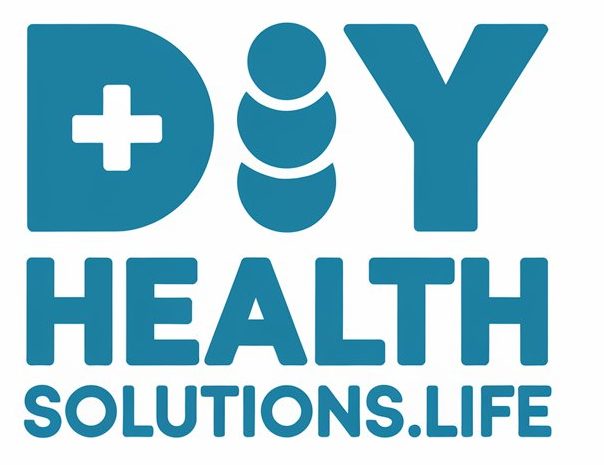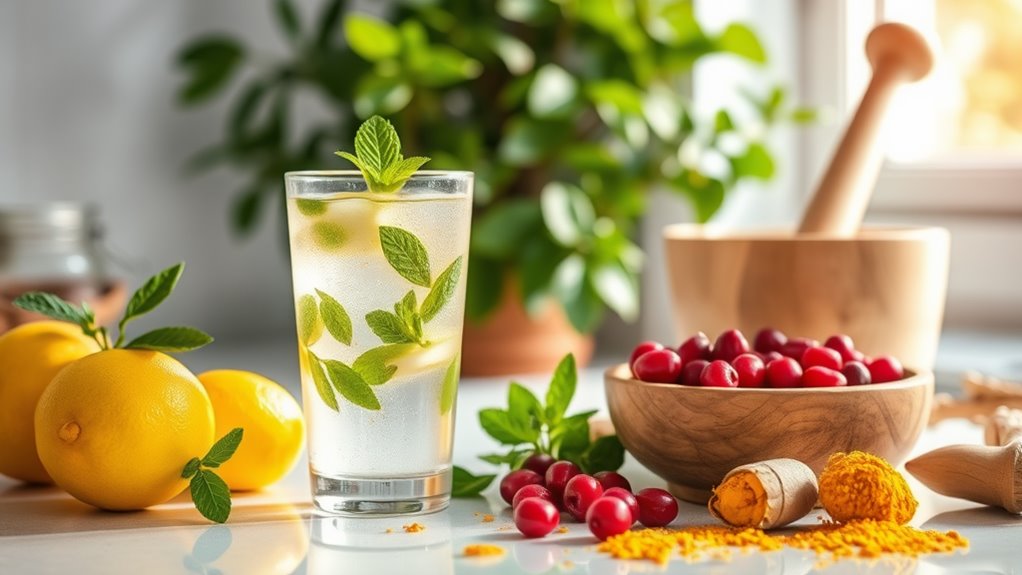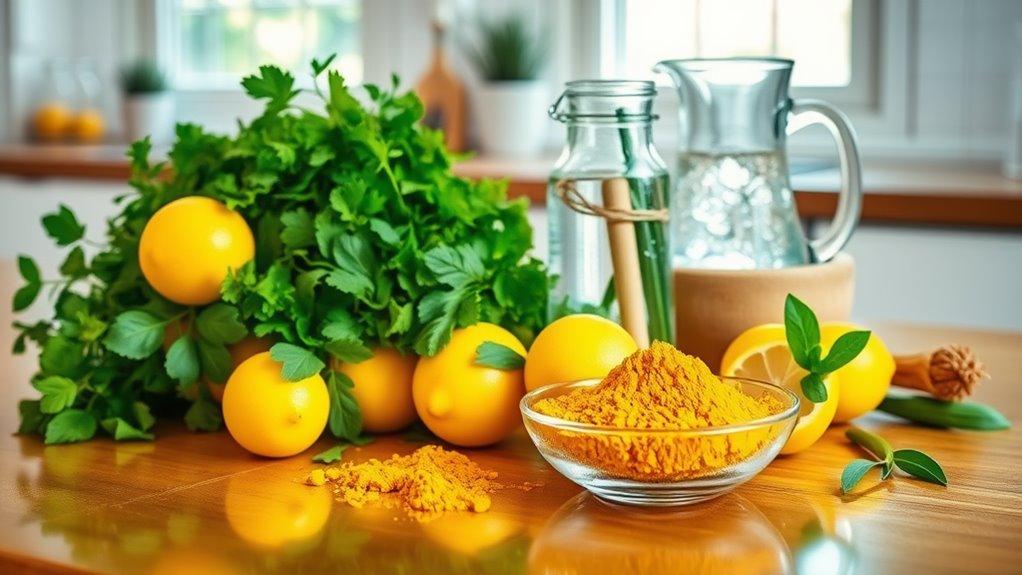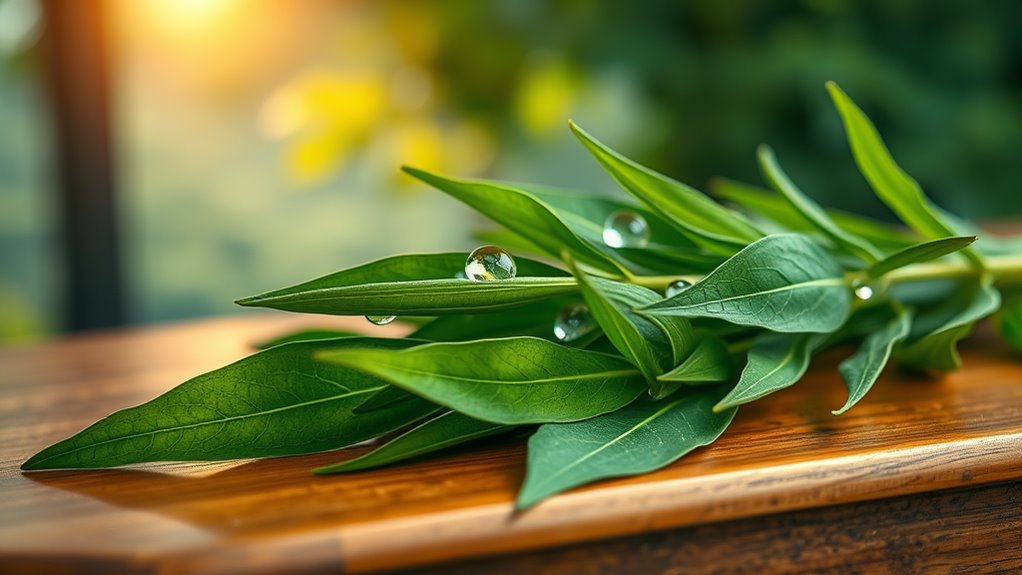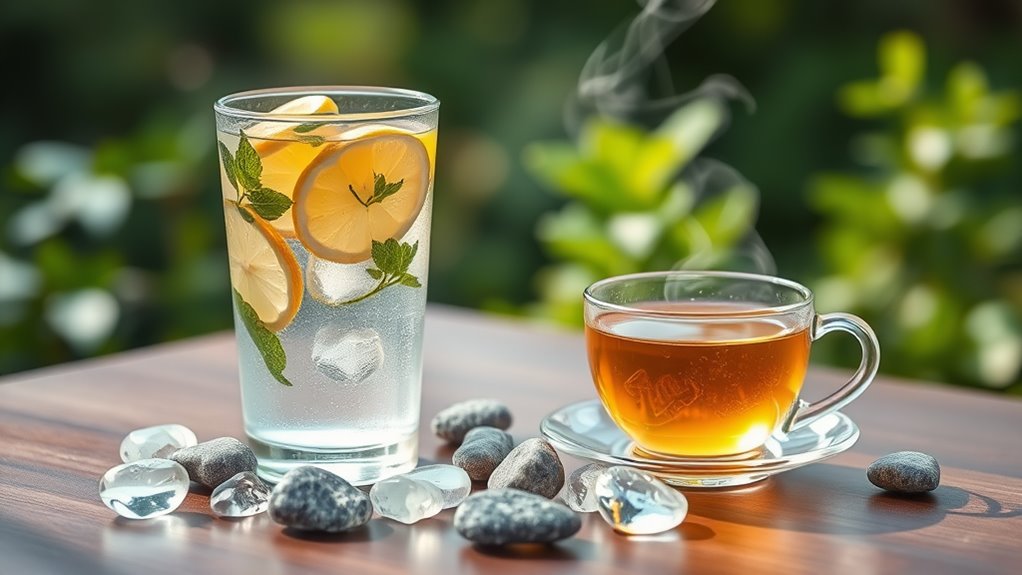Kidney Stone Remedies That Actually Work!
If you’re dealing with kidney stones, several remedies can help ease your discomfort. Staying hydrated is crucial, so aim for 2 to 2.5 liters of water daily. Lemon juice is an excellent choice, as it’s rich in citrates, which can break down stones. You can also try mixing two tablespoons of apple cider vinegar with water for potential relief. Herbal teas, like dandelion root, are great for kidney health too. Remember, before trying any natural remedies, it’s wise to consult a healthcare provider to ensure they’re safe for you. Stick around to discover more tips and strategies for managing kidney stones!
Safety Considerations for Remedies
When considering remedies for kidney stones, it’s crucial to prioritize safety. You might be tempted to try various home remedies, but always consult a doctor first. Some herbal remedies can interact with medications or worsen existing health conditions.
If you’re pregnant or breastfeeding, it’s even more important to seek medical advice to protect both you and your child.
If you have chronic conditions like kidney or heart disease, don’t jump into herbal remedies or dietary supplements without consulting your doctor. Overconsumption of certain treatments, such as apple cider vinegar, can lead to adverse effects like tooth enamel damage and acid reflux, so remember to use everything in moderation.
Also, straining your urine to identify the type of kidney stone can help you and your doctor decide on the best prevention strategies. This process highlights the need for informed medical guidance.
Importance of Hydration
Staying hydrated plays a vital role in preventing kidney stones, as it helps flush out substances that can lead to stone formation. When you drink enough fluids, you dilute the stone-forming substances in your urine, significantly lowering your risk of developing kidney stones. Aim to produce 2 to 2.5 liters of urine daily; this can reduce your risk by up to 50%.
To make sure you’re adequately hydrated, pay attention to the color of your urine. Dark yellow urine is a sign of dehydration, while light, pale yellow urine indicates that you’re on the right track. Health authorities recommend drinking at least 6-8 glasses of water daily.
This increased fluid intake not only helps prevent new stones from forming but can also flush out small stones that may already be present.
Incorporating fluids like lemon juice into your diet can be especially beneficial. The citric acid found in citrus fruits helps break down calcium deposits and increases urine citrate levels, which can further prevent kidney stones.
Effective Natural Remedies
Natural remedies can offer effective support in managing and preventing kidney stones. Incorporating lemon juice into your daily routine can be beneficial. It’s rich in citrate, which can help prevent calcium stones and may even assist in breaking up smaller stones when mixed with water.
Apple cider vinegar is another great option. Its acetic acid content might help dissolve stones and ease any pain. Try mixing two tablespoons in six to eight ounces of water for potential relief.
Basil juice is packed with antioxidants and has been traditionally used to support kidney function. Celery juice may also help break down kidney stones due to its natural compounds, but remember to consult a healthcare provider before trying it.
Of course, hydration is crucial too! Drinking enough water to produce 2 to 2.5 liters of urine daily can significantly help prevent kidney stones and assist in passing existing ones.
Medical Treatments Available
Medical treatments for kidney stones play a crucial role in managing pain and facilitating stone passage. When you’re dealing with the discomfort of kidney stones, pain relief medications like NSAIDs, such as ibuprofen and naproxen, can help ease your pain during the process.
If the stones are larger, ureteroscopy may be necessary. This minimally invasive procedure uses a laser to remove or break up stones and is typically performed under general anesthesia.
Another effective treatment is extracorporeal shock wave lithotripsy (ESWL), which uses sound waves to break kidney stones into smaller pieces, making it easier for you to pass them through your urinary tract.
In more severe cases, surgical intervention might be required, especially for stones that are too large or causing severe complications. Procedures like percutaneous nephrolithotomy (PCNL) can be performed to tackle these issues.
Additionally, doctors might prescribe alpha blockers to help relax the muscles in your ureter, which can facilitate the passage of stones and lessen the pain associated with their movement.
With these medical treatments, you have options to manage your kidney stones effectively and find relief.
Symptoms and When to Seek Help
Experiencing kidney stones often comes with a range of symptoms that can signal when it’s time to seek help. You might feel severe flank pain, which is often sharp and intense, or experience nausea and vomiting.
These symptoms may indicate a blockage in your urinary tract, so don’t ignore them. If you notice blood in your urine or have burning sensations during urination, it’s crucial to consult a healthcare provider.
If your pain lasts more than four weeks or you develop fever and chills, you should seek immediate medical evaluation. These could be signs of an infection, which can complicate your condition.
Cloudy or foul-smelling urine, along with sudden changes in urination patterns, also require timely medical consultation.
Dietary Recommendations for Prevention
To effectively prevent kidney stones, it’s essential to consider your dietary choices. Staying well-hydrated is one of the most important steps you can take. Aim to drink at least 2 liters of water daily to dilute your urine and reduce the risk of kidney stone formation.
Adding citrus fruits like lemons and limes to your diet can also be beneficial, as they increase your citric acid intake, which helps bind calcium in your urine.
Limiting your sodium intake to no more than 2,300 mg per day can decrease calcium excretion in your urine, lowering the risk of calcium-based stones. It’s also crucial to consume adequate dietary calcium, about 1,000 mg daily, from sources like dairy products. This helps bind oxalate in your intestines, further reducing the likelihood of stone formation.
Lastly, moderating your animal protein intake is key. Too much animal protein can increase calcium excretion and decrease urinary citrate levels, both of which are associated with a higher risk of kidney stones.
Lifestyle Changes to Consider
Making simple lifestyle changes can significantly impact your kidney health and help prevent the formation of stones. One of the most effective steps you can take is to increase your water intake to produce 2 to 2.5 liters of urine daily. This hydration dilutes stone-forming substances, reducing your risk of kidney stones.
In addition, focus on dietary changes that support kidney stone prevention. Eating calcium-rich foods, like dairy products, helps lower the risk of calcium oxalate stones because calcium binds with oxalate in the intestines, minimizing its absorption.
Limiting your sodium intake to 2,300 mg daily can also help decrease urinary calcium excretion, which is crucial for preventing stones.
Moreover, try to reduce animal protein consumption, as high intake can lead to increased calcium excretion and lower urine citrate levels. To boost your urine citrate levels, incorporate citrus fruits like lemons and limes into your diet.
Evidence-Based Insights
While many remedies for kidney stones exist, evidence-based insights provide a clearer understanding of what truly works. To prevent kidney stones, one of the most effective methods is increasing your fluid intake. Aim to produce 2 to 2.5 liters of urine daily; this can reduce your risk by up to 50%.
Incorporating hydration strategies like drinking plenty of water and adding freshly squeezed lemon juice can be beneficial. Lemon juice contains citrate, which not only helps break down small stones but also may prevent calcium stone formation.
When it comes to diet, consuming calcium foods, like dairy products, can actually lower your risk of kidney stones. They bind to oxalate in your intestines, preventing absorption that could lead to stone formation.
However, be cautious with animal protein, as high intake can elevate your risk by increasing calcium excretion in your urine. It’s all about balance!
If you ever experience severe symptoms, don’t hesitate to seek medical attention. While some home remedies can be useful, understanding these evidence-based insights will empower you to make informed choices in your kidney stone prevention journey.
Understanding Kidney Stone Formation
Kidney stones form when substances like calcium, oxalate, and uric acid become concentrated in your kidneys and crystallize. When these substances build up, they create solid waste material, which can lead to discomfort.
Did you know that about 80% to 85% of kidney stones are calcium-based? The rest are usually uric acid stones, often linked to low urine pH levels.
You might experience symptoms like severe flank pain, nausea, vomiting, or even blood in your urine if a stone blocks your urinary tract. This blockage can be quite painful and may require medical intervention to prevent further complications.
To diagnose kidney stones, healthcare professionals use tests like urinalysis, renal ultrasound, or CT scans to pinpoint the presence and type of stones.
Understanding how kidney stones form is crucial for prevention. By staying hydrated and managing your diet to limit calcium and oxalate intake, you can help reduce the risk of developing these painful stones.
Resources for Further Reading
To better understand kidney stones and how to manage or prevent them, exploring additional resources can be incredibly helpful. You might want to check out medical journals that focus on hydration and its significant role in reducing kidney stones. Studies suggest drinking around 2 liters of water daily keeps your urine dilute, cutting your risk by 50%.
Consider looking into dietary modifications as well. Research shows that increasing your intake of citric acid, like that found in lemon juice, can help dissolve certain stones. Potassium citrate supplements are another option, particularly effective against calcium stones.
Don’t forget about sodium intake! Keeping it under 2,300 mg per day can reduce calcium excretion in your urine, which is vital for preventing stones.
It’s also worth noting that maintaining a healthy weight can play a big role in stone recurrence, as over 43% of individuals with kidney stones are overweight.
